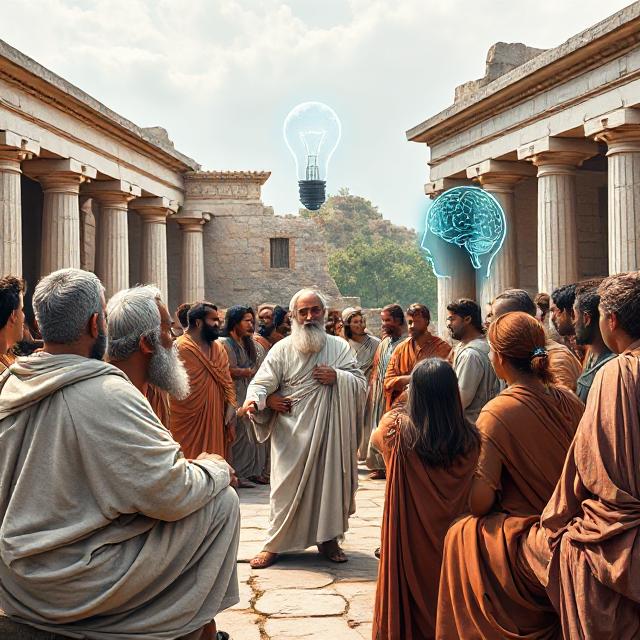
Table of Contents
Socrates Critical Thinking: Origins of a Method
Socrates didn’t write books. He didn’t build a school. Yet more than two millennia later, his legacy thrives in classrooms, courtrooms, and public debates. Why? Because Socrates didn’t just teach people what to think—he taught them how.
The Socratic method, or elenchus, laid the foundation for critical thinking as we know it. His relentless questioning reshaped intellectual inquiry and ignited a tradition of reflective reasoning that would define Western philosophy—and the modern educational system.
I. Who Was Socrates?
Socrates (c. 470–399 BCE) was an Athenian philosopher whose influence endures despite never having written a word. We know him primarily through the dialogues of his student Plato, and to a lesser extent through Xenophon and the playwright Aristophanes.
He wandered the streets of Athens, questioning citizens, exposing contradictions in their beliefs, and urging them toward self-examination. His motto? “The unexamined life is not worth living.”
This drive for intellectual integrity, and the methods he used, gave birth to modern critical thinking.
II. What Is Critical Thinking?
Critical thinking is the disciplined process of actively evaluating, analyzing, and synthesizing information to form a reasoned judgment. At its heart are principles such as:
- Skepticism: Don’t take claims at face value.
- Logic: Use reason to connect ideas coherently.
- Clarity: Seek clear, precise definitions.
- Open-mindedness: Remain willing to revise views.
- Evidence-based reasoning: Favor facts over opinions.
These pillars align remarkably with Socratic practice.
III. The Socratic Method Defined
The Socratic method isn’t about lecturing. It’s about dialogue, particularly questioning. Socrates would pose a question, receive an answer, and then probe that answer with further questions. The aim was to uncover assumptions, expose contradictions, and refine understanding.
Example:
Socrates: What is justice? Interlocutor: Justice is telling the truth and repaying debts. Socrates: But what if repaying a debt causes harm? Is that still just?
This approach forces people to examine their beliefs rather than defend them blindly.
IV. Socrates in Modern Education
Today, many educational systems incorporate Socratic questioning to encourage deeper learning:
- Law schools use it to teach legal reasoning.
- Philosophy classes use it to explore ethical dilemmas.
- Medical training uses it for diagnostic reasoning.
In the classroom, teachers who use Socratic seminars ask open-ended questions and guide discussions without offering answers. The goal: develop students’ abilities to reason independently.
Moreover, Socratic questioning is part of Bloom’s Taxonomy in education—especially the higher-order thinking skills like evaluation and analysis.
V. Socratic Thinking in Psychology and Therapy
Socratic principles are used in Cognitive Behavioral Therapy (CBT) to help patients examine their thought patterns:
- A patient claims: “I’m a failure.”
- The therapist asks: “What’s the evidence for that?”
- “Are there counterexamples?”
- “How would you view a friend who said the same thing?”
This is Socrates at work—challenging self-defeating beliefs through reasoned inquiry.
VI. The Ethical Foundation of Socratic Thinking
Socrates emphasized virtue and the pursuit of truth above all. He believed ignorance was the root of wrongdoing and that knowledge led to ethical action.
By applying critical thinking to moral dilemmas, Socrates showed that logic wasn’t just a tool for debate—it was a path to wisdom and character development.
This remains essential to ethical decision-making today, whether in professional ethics, law, medicine, or personal relationships.
VII. Socratic Legacy in Logic and AI
The methodical, logic-based nature of Socratic questioning parallels how artificial intelligence systems reason today.
- AI models arguments through logical structures.
- Socratic logic inspired predicate logic and formal systems in mathematics.
Thus, Socratic influence extends into the digital realm, powering the engines of modern information processing.
VIII. Limitations and Criticisms
While powerful, the Socratic method isn’t without its critiques:
- Can be confrontational: Some see it as a rhetorical trap.
- Lacks content: It focuses on deconstruction more than construction.
- Dependent on the skill of the questioner: Poor questioning leads nowhere.
Nonetheless, its core value—to question assumptions—remains essential to thinking well.
IX. Why Socratic Thinking Still Matters
In an age of misinformation, echo chambers, and clickbait, the ability to question intelligently is a civic necessity. Socratic critical thinking helps us:
- Spot fallacies in media
- Evaluate policies and claims
- Make informed decisions
- Understand ourselves
More than a relic of the past, Socratic questioning is a blueprint for navigating complexity.
X. Conclusion: Socrates as a Living Method
Socrates Critical Thinking is not just about a historical figure—it’s about cultivating a mindset. The Socratic method teaches us that truth isn’t handed down; it’s wrestled with.
By questioning deeply, clarifying ideas, and embracing uncertainty, we honor Socrates—not by quoting him, but by thinking like him.
His life, his trial, and his death all affirmed a single principle: that reasoned inquiry is the soul’s greatest tool. And for as long as we use that tool, Socrates lives on in every question we dare to ask.
